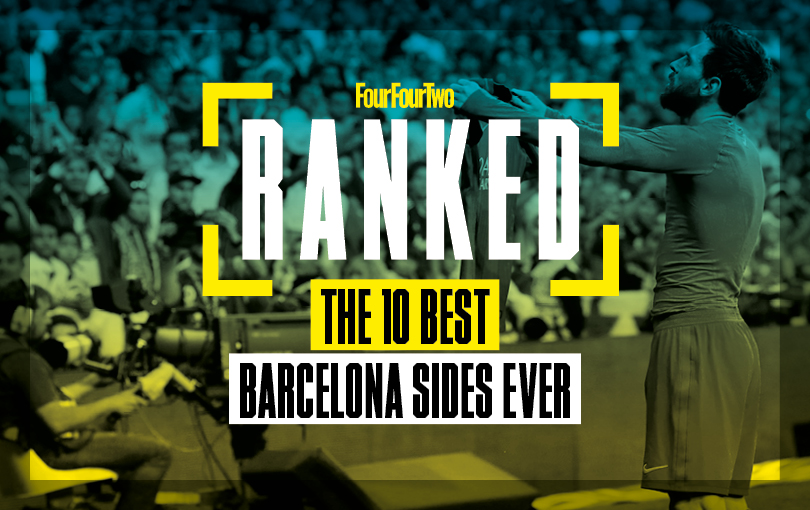
In 2011, Pep Guardiola won his second Champions League title as Barcelona manager with arguably the greatest performance his side had ever delivered - and what a stage to do it.
It was a display that had everything you’d associate with Barcelona. Control, dominance and attacking intent throughout as Barca toyed with Manchester United like a cat with a ball of string. Yet when asked whether this side had surpassed the ‘Dream Team’ that Guardiola himself had been a part of under Johan Cruyff, Pep was coy to answer.
Instead, he said that this side would never have been possible with Cruyff’s team. The way that Guardiola saw it, his philosophy was merely a continuation of his mentor’s and that the Barcelona way - the correct way to play - was the most important thing.
Well, we’re going to pose the questions that Pep himself wouldn’t answer. Which team was the best? There are plenty to choose from…
Note: For most of these sides, we're simply looking at one season that defined them, though others were defined by a longer period of time - perhaps they kept winning across that period or didn't have so much change over a few years.
The best Barcelona sides ever: 10. 1982 - 1984
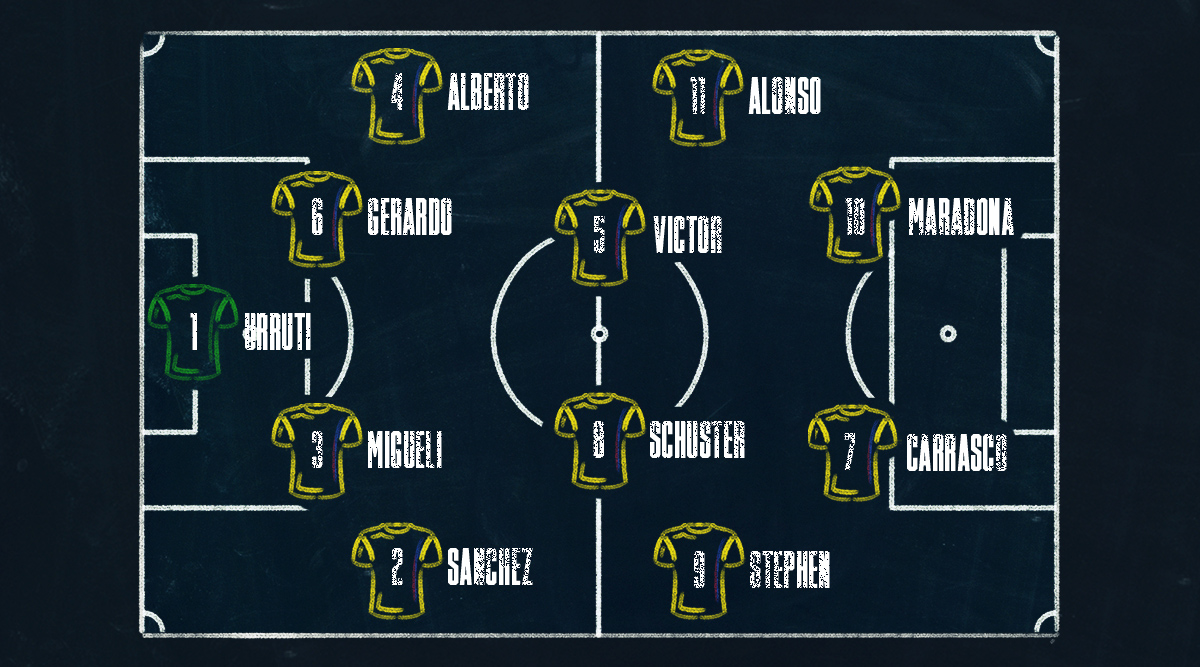
In an El Classico tie in 1983, Diego Maradona rounded the goalkeeper and was about to score, before a flying tackle came in from Juan Jose. Maradona stood still, waiting for the defender to smack into the post, slotting the ball into the empty net. The Argentine was the first Barcelona player to be given a standing ovation by a Bernabeu audience.
He was an undisputed world-beater and would have won more in Spain, perhaps, had it not been for bad luck and ill-discipline. He suffered hepatitis, before a broken ankle - caused by Andoni “the Butcher of Bilbao” Goikoetxea - though sometimes he was to blame for trouble.
At one point, Diego trashed the Camp Nou trophy room because he wasn’t allowed his passport - while his Barca career ended with him in the centre of a mass brawl, kicking and punching anyone in an Athletic Bilbao shirt, after an on-pitch argument broke out into a shocking fight.
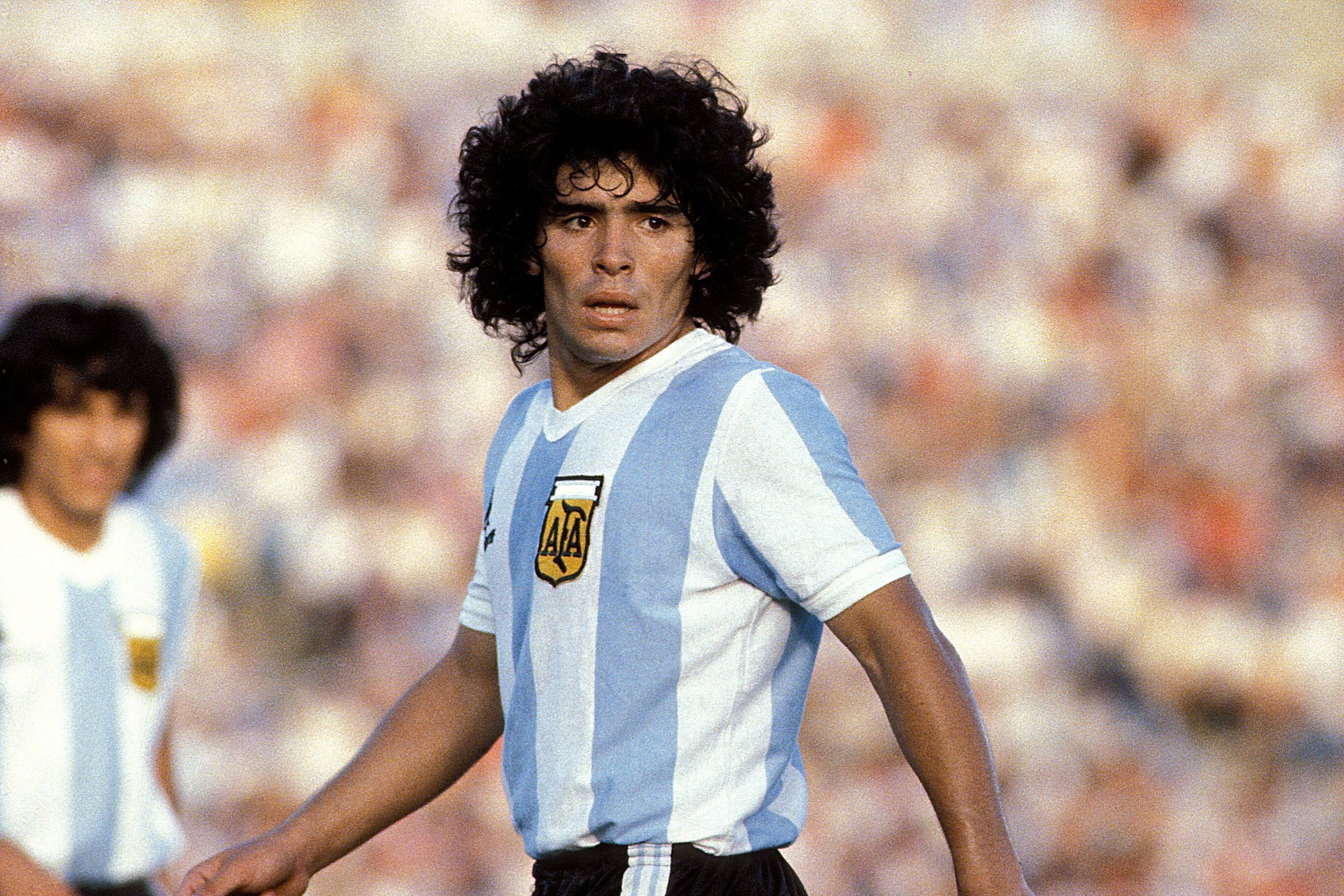
IN MEMORY OF A GENIUS How our celebration of the legend's bizarre life became an unintended eulogy
Long before Barca execs were trying to offload Maradona to Napoli for his nonsense though, Maradona was the jewel of the side under legendary managers Udo Lattek - who managed Bayern Munich in their glory years - and Cesar Luis Menotti - who won the World Cup with Argentina in 1978. Bernd Schuster was in that side too - a future Real Madrid star.
It was a pleasure to watch the Argentine at the time, given free roam in front of a solid defence and hard-working midfield, often partnering Lobo Carrasco up top for the Blaugrana. It was a great side but not one that won a league trophy.
9. 1959/60
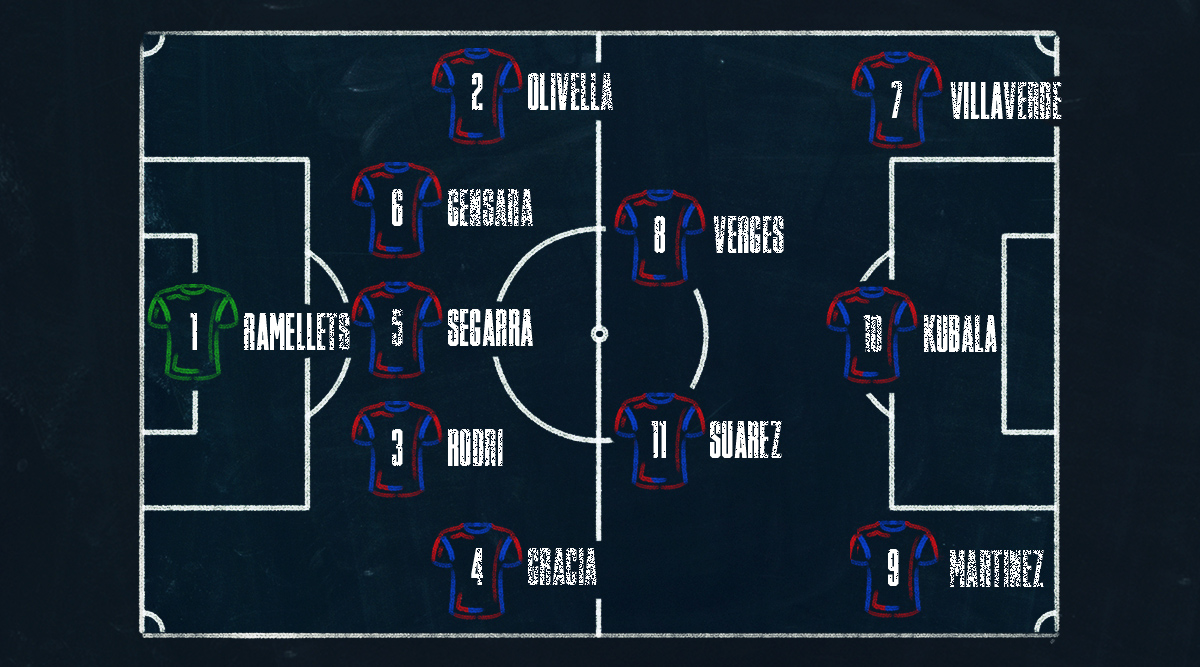
Long before Barcelona became wedded to the beautiful Cruyffian ideals that would come to define the club, another kind of philosopher was at the reigns of the club. Helenio Herrera won La Liga in 1950 and 1951 with Atletico Madrid and arrived in Catalonia as the king of “catenaccio”, a style of play that relied on a sweeper-type defender to act as a door lock and keep the defence tight.
Herrera is often likened to Jose Mourinho for his larger-than-life persona and tactics which history has chalked up as dour compared to more “progressive” managers - but that’s not to say that Barca didn’t still play fluid, attacking football at times that later presidents would have been proud of. Hungarian Laszlo Kubala and 1960 Ballon d’Or winner Luis Suarez were the two stars of the side, which won La Liga in 1958/59 and 1959/60.
Herrera left the club in 1960 after clashing with Kubala one too many times, taking charge of the Spanish national side before going to Inter Milan and winning two European Cups with his talisman Suarez. Barca were the first side to ever knock Real Madrid out of the European Cup, too, during Herrera’s time at the club - it’s a case of maybe what could have been for this phenomenally talented side, despite the domestic dominance. Maybe that first wait for a European title could have come sooner.
8. 1996/97
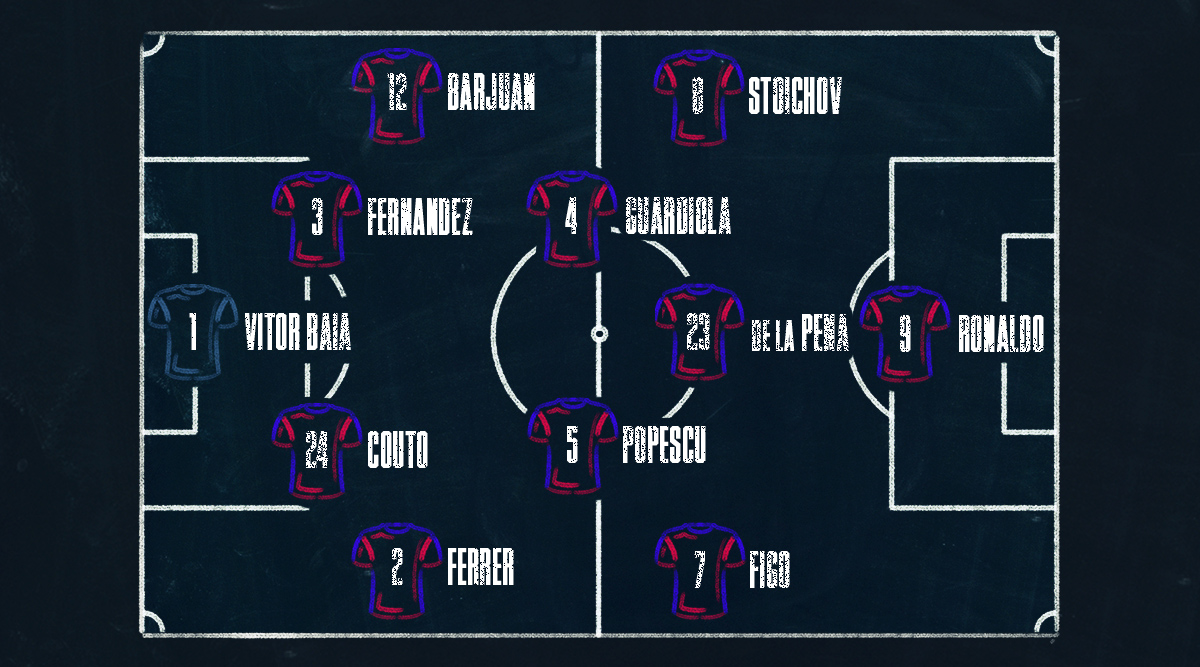
Imagine having Bobby Robson on your bench, Jose Mourinho as his translator and Pep Guardiola as your captain. You should be fine for leadership, right? Now imagine you’ve got Ronaldo up front, too.
But this was a tough time in Catalonia. Johan Cruyff, the club’s modern founding father, had just left - Robson stepped up though, winning the UEFA Cup Winners' Cup, the Copa Del Rey and finishing second in La Liga. “He arrived as if he was in Barcelona for the last 20 years,” former president Joan Gaspart beamed of the once England boss.
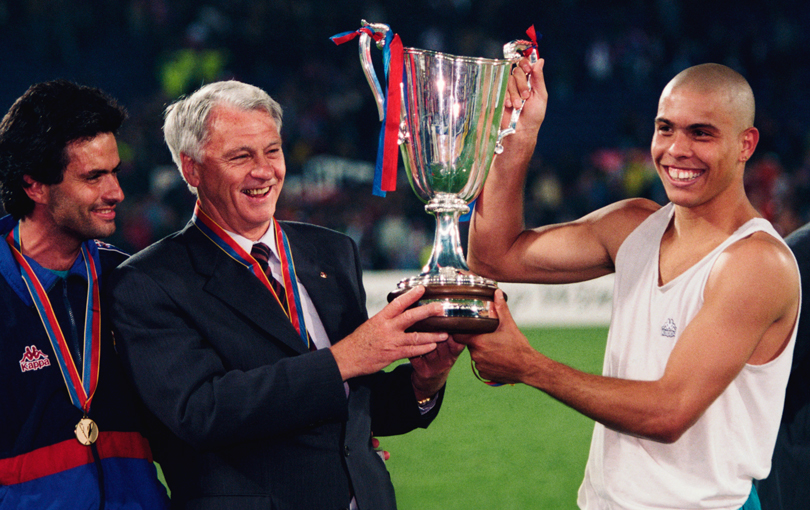
Robson’s side were tactically flexible, extremely intelligent and had talent in spades. Of course, Ronaldo’s stellar season leading the line was the big talking point of the campaign - he hit an incredible 47 goals in all competitions - but the likes of Luis Figo and Hristo Stoichov were still reliable forces, too.
Both Ronaldo and Robson were at their peak of their powers, here. This was to be a one-season wonder for both, though - Louis van Gaal replaced Sir Bobby, while R9 went to Inter. The memories of that campaign - one in which expectations were sharply adjusted before it began - are still sweet, to this day.
7. 1973/74
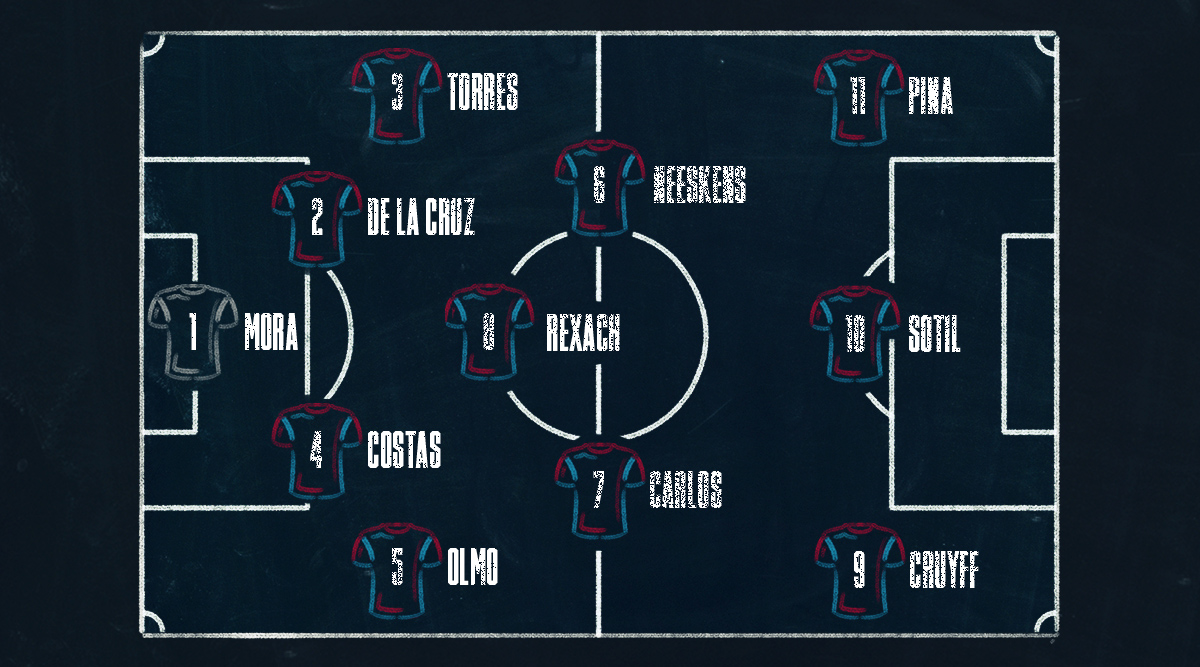
The foundations for the ‘Dream Team’ of 1992 had its foundations laid decades before. Johan Cruyff joining the club as a player in 1973 was a clear catalyst but even before that, Barca geared up for a possession-based style by hiring Vic Buckingham in 1969 - a pioneer Tottenham Hotspur’s push-and-run style before he went to Ajax to work on total football - before replacing Buckingham with Rinus Michels in 1971.
Michels had overseen the dominant, multiple Eredivisie-winning Ajax sides of the 1960s and lifted the European Cup in 1971. This was a piece of what Barcelona wanted and so they tempted the Dutchman to the Camp Nou to work his magic. A year later he brought Cruyff - for a record transfer fee - and the jigsaw was complete.
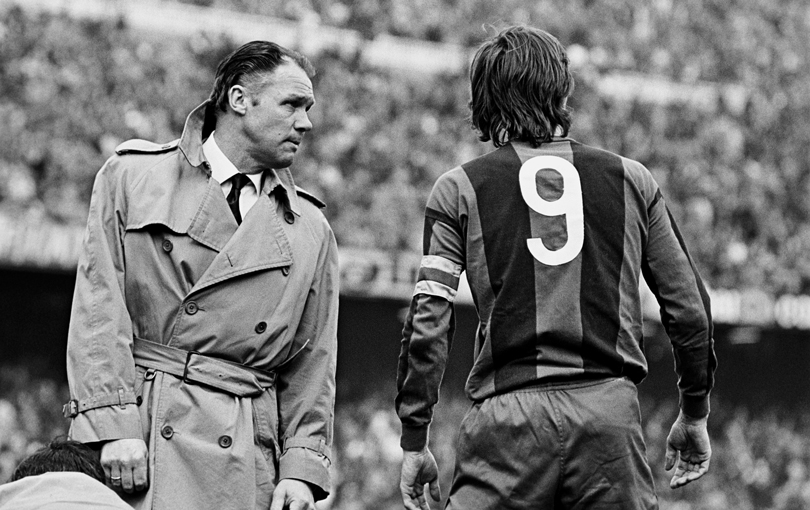
Cruyff turned down Real Madrid - saying he could never join a club “associated with Franco” - and won La Liga in his first season, beating Real 5-0 on their own patch. Michels weaved his total football masterplan to devastating effect that night, with Cruyff spraying passes from deep for the likes of Carles Rexach and Juan Carlos to run onto, exhausting the opposition defence.
Cruyff picked up the European footballer of the Year awards in 1973 and 1974. Few would successfully mark him until Franz Beckenbauer managed to get one over the Dutchman at the World Cup final of 1974. A European Cup never came but Cruyff excelled in Catalonia as a player.
6. 1998/99
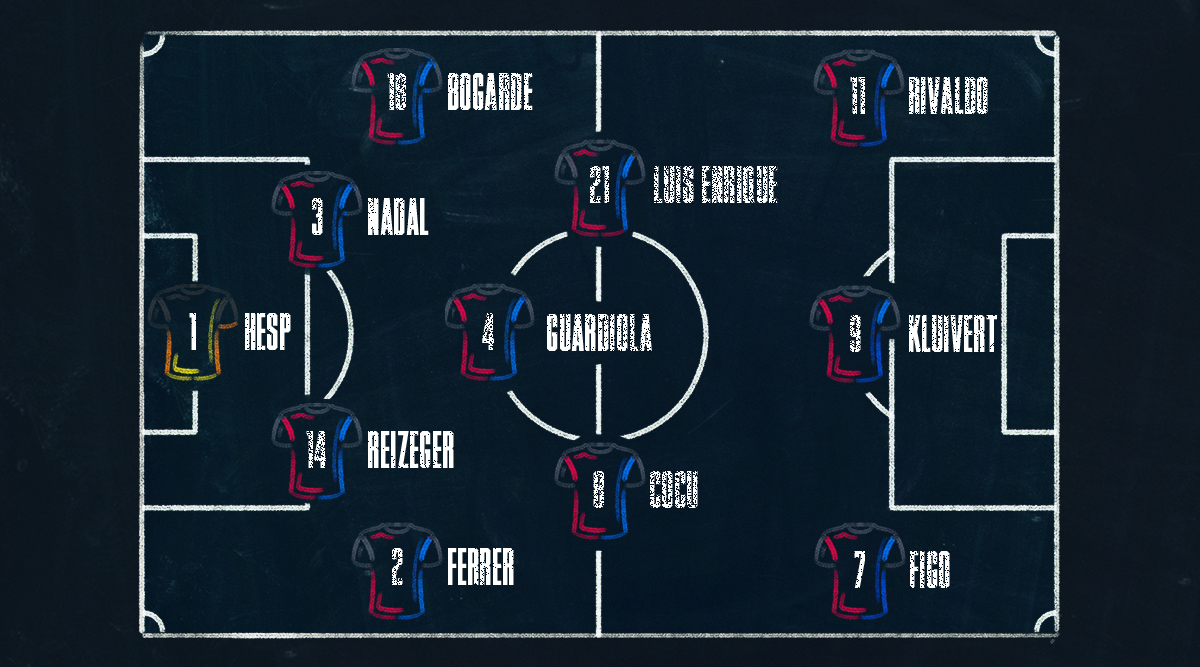
“[My] philosophy does not correspond with the culture of the country.” Louis van Gaal said when he left Barcelona in the new millenium. As a player, he was a substitute to Cruyff at Ajax; he rebuilt Ajax as a manager after Cruyff left and was the natural successor to him at Barcelona - he loved possession and relied on the academy at his fingertips. So surely his philosophy should’ve corresponded?
Cruyff disagreed - he was said to despise van Gaal’s less enthralling style of play and Bobby Robson even said that he felt he was brought in for one season specifically as a buffer between Cruyff and van Gaal. When he arrived though, van Gaal brought a raft of fellow countrymen, such as Kluivert, the De Boer brothers, Boudewijn Zenden and Ruud Hesp, rebuilding the side in his image.
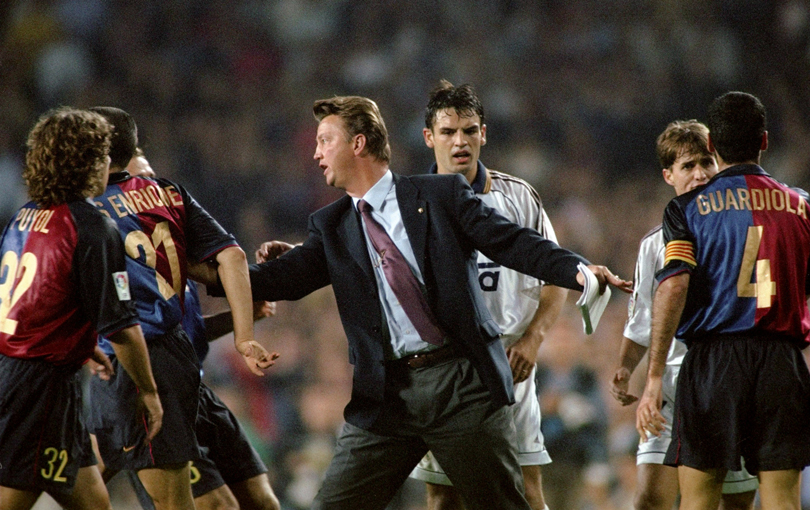
The Dutchman came in just as Ronaldo was packing for Inter and had to implement a rigorous system to compensate - just as he did when Dennis Bergkamp left for I Nerazzurri while he was at Ajax. For sheer talent though, van Gaal's was still one of the greatest Barca sides ever.
Van Gaal won two La Ligas in Spain so the decision to hire him was somewhat vindicated, at least. After an unconvincing double in his first season - if there is such a thing - Barca began controlling games far more a season later, relying on incredible flair from Ballon d’Or-winning Rivaldo.
They did exit the Champions League in the group stage two seasons in a row - quite the blemish - but it was a hell of a squad while it lasted. When cracks began to show in 2000, Louis left to manage the Netherlands’ ill-fated 2002 World Cup qualification campaign. At least there, no one could complain that he picked too many Dutchmen.
“What has Barcelona won in 100 years? How many Champions Leagues?” van Gaal questioned in his post-exit interview. “In six years at Ajax I won more than Barcelona had won in 100 years.” Unbelievable, really, that he had a second spell after that comment.
5. 2004 - 2006
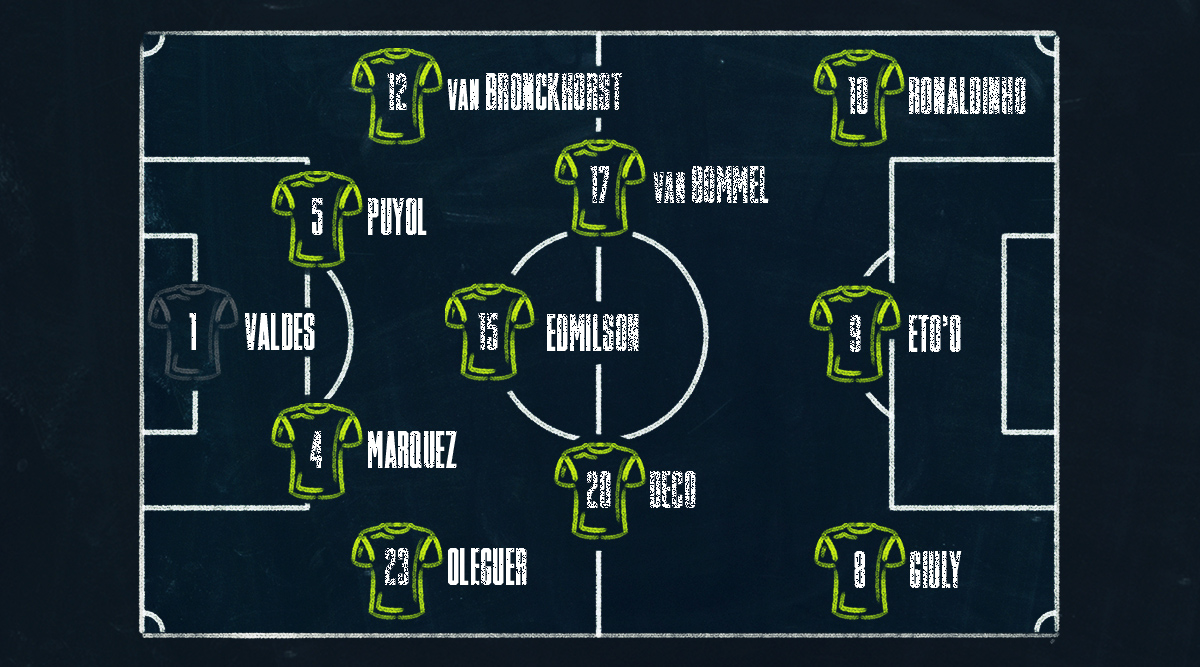
There were some who were concerned with the idea of Frank Rijkaard managing a club of Barcelona’s stature. He was, to say the least, a volatile character - but the temper he displayed as a player melted away as he became a figure of calm in the dugout.
Rijkaard ended a trophy drought of six years, making big-name signings in his first season in charge in the form Samuel Eto’o and Deco. The team revolved around the talents of Ronaldinho, as Rijkaard oversaw an exodus of older stars - Dutch trio Philip Cocu, Patrick Kluivert and Michael Reiziger all saw their contracts terminated, while Luis Enrique and Marc Overmars retired.
The result was instant. Barcelona won the league playing football with flair, thanks to their exciting attack. A season later, they made very little change but drafted in youth product Lionel Messi a little more - whatever happened to that fella? - producing the first iconic front three that the little genius was a part of, alongside Ronaldinho and Eto’o.
In 2006, Barcelona retained the league title again ahead of Real Madrid before breaking Arsenal hearts in Paris to lift their second Champions League title. Frank Rijkaard had a short spell at Galatasaray but has largely left the picture as far as management is concerned - he’s the second-longest serving Barca boss since Cruyff, either way.
4. 2014/15
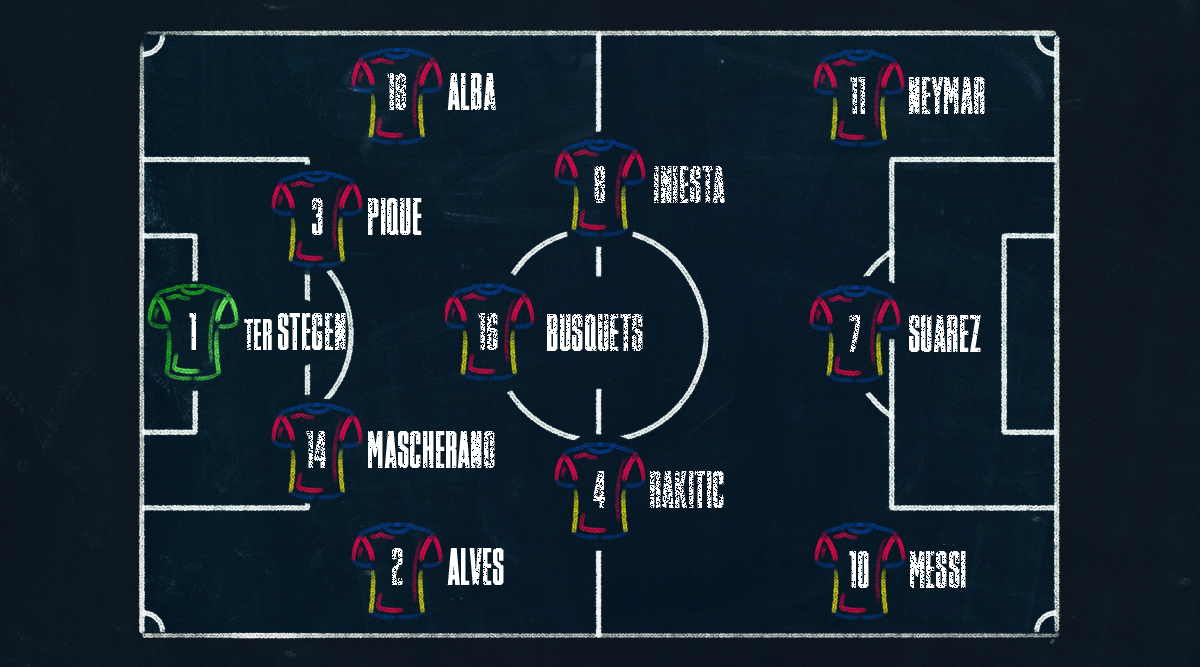
By 2015, Barcelona hadn’t won a Champions League title since Pep Guardiola’s last one in 2011 - astonishing, really, considering the calibre of their players and the contingency plan that Pep himself put in place. But the semi-finals of the competition would pair up one club legend with another, as Pep’s new side, Bayern Munich, took on Luis Enrique’s Barca.
Guardiola’s Camp Nou return was a sour one, with his team tied in knots by that trident. Having Messi, Suarez and Neymar in your team was enough for anyone - they netted an unprecedented 122 goals in all competitions that campaign and beyond that this team didn’t need much more coaching to overcome Pep’s evolving ideals. Players like Pique, Rakitic, Iniesta, Busquets and Alves coached themselves by now.
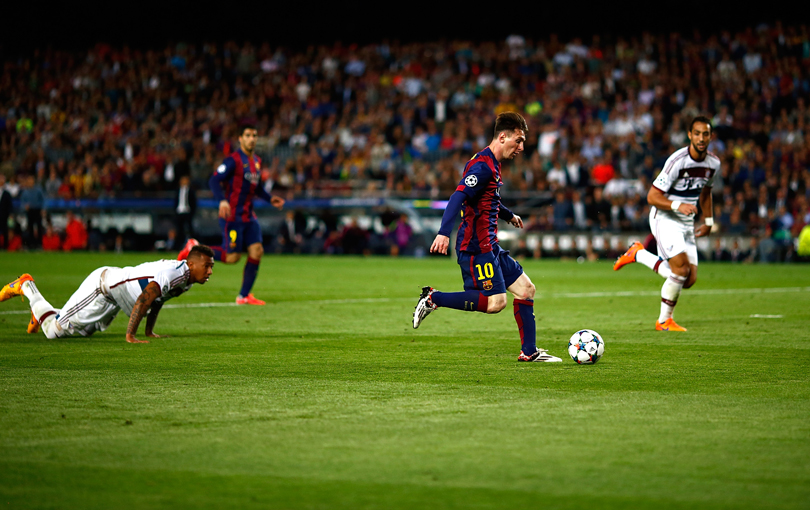
Messi famously folded Jerome Boateng inside out before chipping Manuel Neuer with his right foot. It summed up the season - even against world-class opposition, just a moment of genius was enough. This was proof, too, that there was life without Pep Guardiola. Manchester City - take note.
Barcelona won the treble, obliterating all before them with arguably the most potent attack of all time. It’s not the prettiest side they ever built but it’s probably the most ferocious.
3. 1990 - 1994
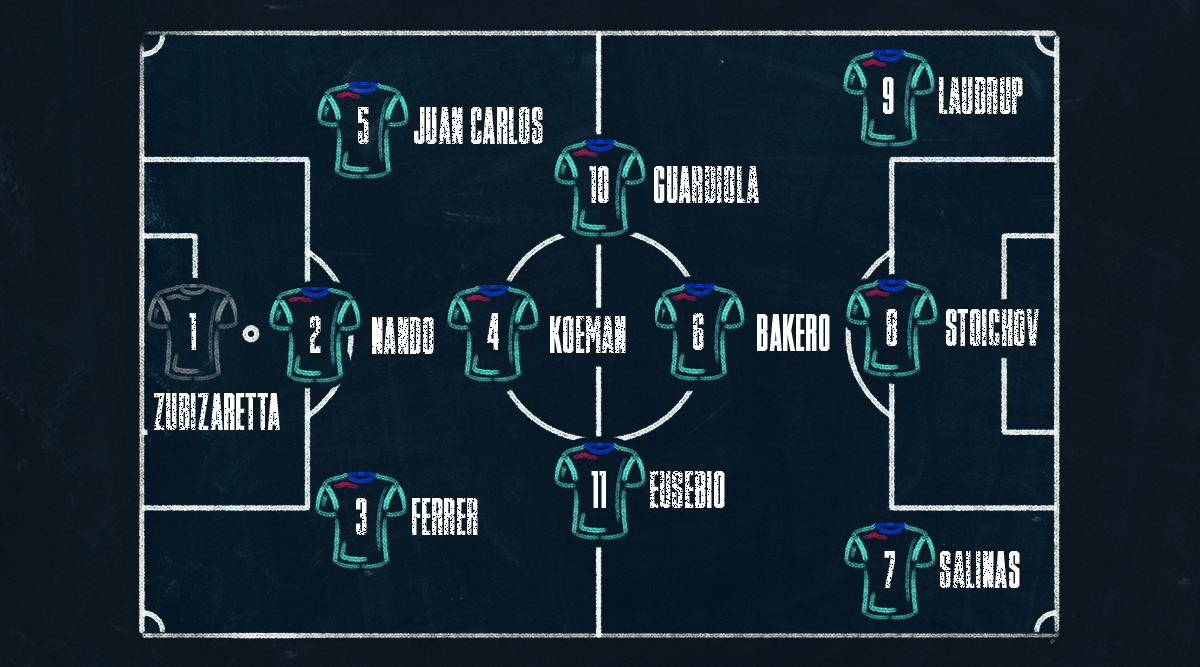
It was said that in British music in the 1990s, everyone was influenced by Oasis whether they wanted to be or not - you either kicked against them or embraced them. Well, Cruyff was the parallel in European football at the time.
Camp Nou attendances were at 40,000 spectators just a decade prior. Barcelona weren’t winning trophies around this time, of course, but they weren’t winning plaudits either: Terry Venables and Luis Aragones had both deployed pragmatic tactics and the Cules were growing tired of their team.
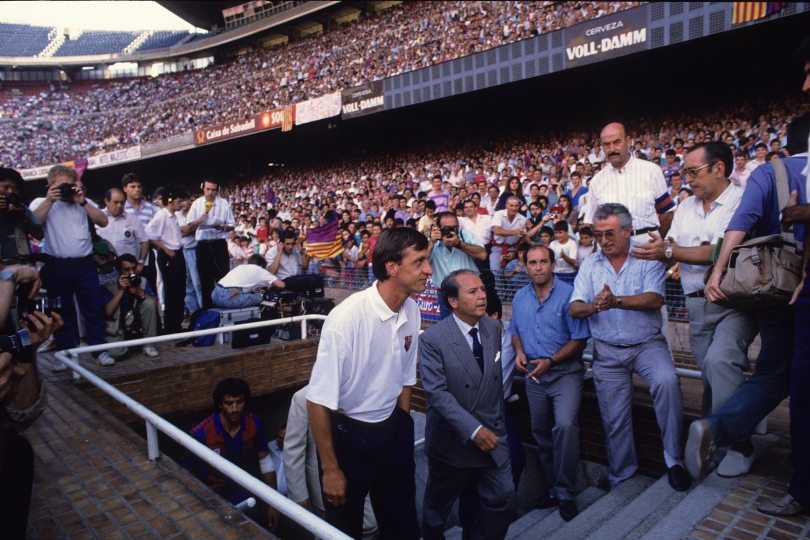
Enter Johan Cruyff. A Cup Winners’ Cup winner with Ajax, Catalonia’s favourite adopted son brought in his 4-3-3/3-4-3 hybrid, drawing from the La Masia academy and teaching Barcelona a new way to play. He moved Guardiola from the wing to become the tempo-setter in midfield, while Ronald Koeman would step out from being a centre-back to start play at the base of midfield.
Barcelona had won two La Liga titles in a 30-year stretch before Cruyff arrived. Under the Dutchman’s free-flowing philosophy, they lifted four in a row and completed their first European Cup triumph in 1992 - thanks to a rocket from the gallivanting Koeman.
He didn’t just put together a successful team, he created a style of play, celebrated the world over, that would become ingrained into the DNA of a club. He’s arguably the most influential man in the game ever - and this was his managerial masterpiece.
2. 2008/09
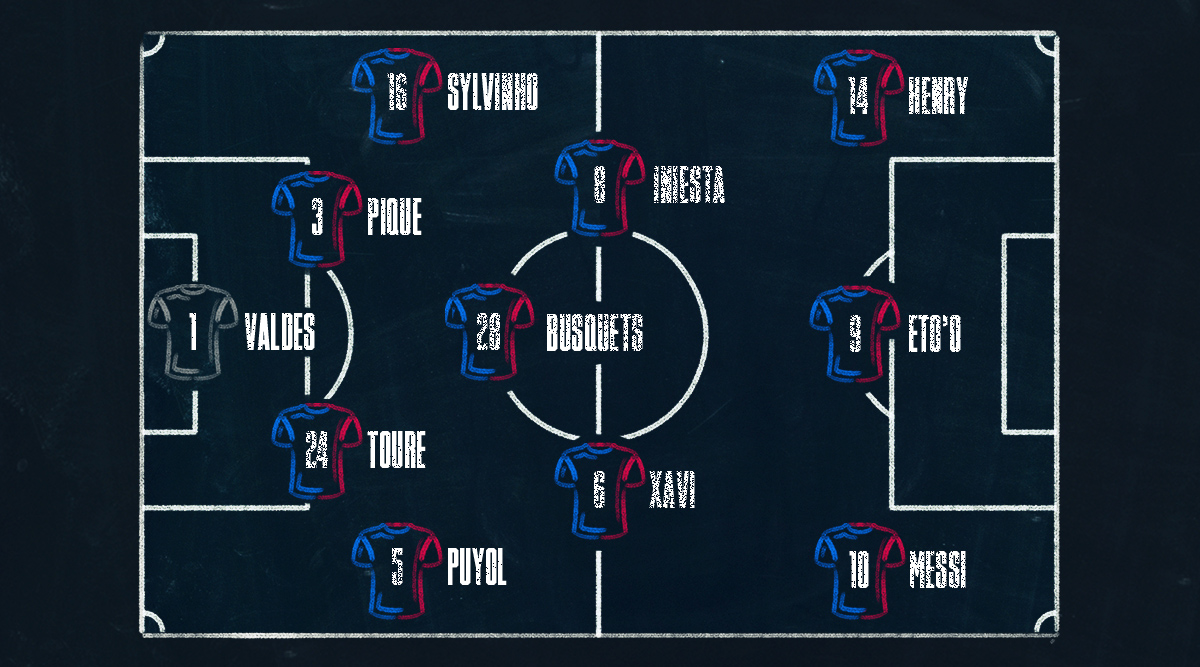
It’s sometimes levelled at Pep Guardiola that he never gives himself a challenge - he always manages the big guns. People forget though that when he took over Barcelona, they hadn’t won anything for two seasons - they were a shadow of their former Rijkaard-led side and in one of his first missions at the club, he went to war with his bosses.
Lionel Messi wanted to represent Argentina at the 2008 Beijing Olympics, something Barcelona weren’t keen on him risking himself for. Pep argued his case, stating what a strong learning opportunity it was for him as a player, winning gold in Barcelona in 1992.
Pep won the battle, Messi followed in his mentor’s footsteps and brought home gold. It was the first real sign of this young player showing he was a winner - Guardiola had such faith in him that he sold Ronaldinho and Deco to clear space for Messi to play.
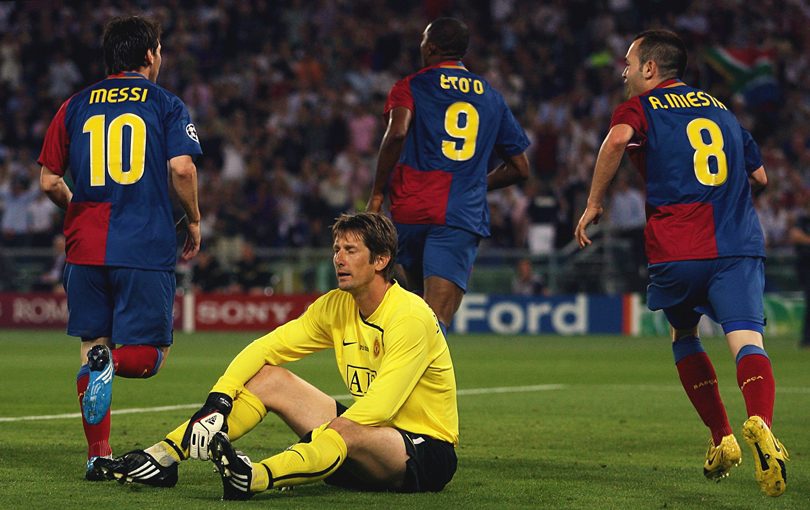
It was a bold move at the time and it could have backfired so easily - yet it proved to be a masterstroke. The early faith in Messi paid dividends, as Samuel Eto’o and Thierry Henry combined with the little genius to devastating effect. Xavi and Andres Iniesta become generals of Pep’s philosophy - the same positional play that he’d been educated in - as Barcelona swept to a magnificent treble.
It showed a glimpse of what this incredible young manager - and his unbelievable protege - could deliver. Guardiola became the youngest manager of all time to ever win the Champions League in 2009.
1. 2010/11
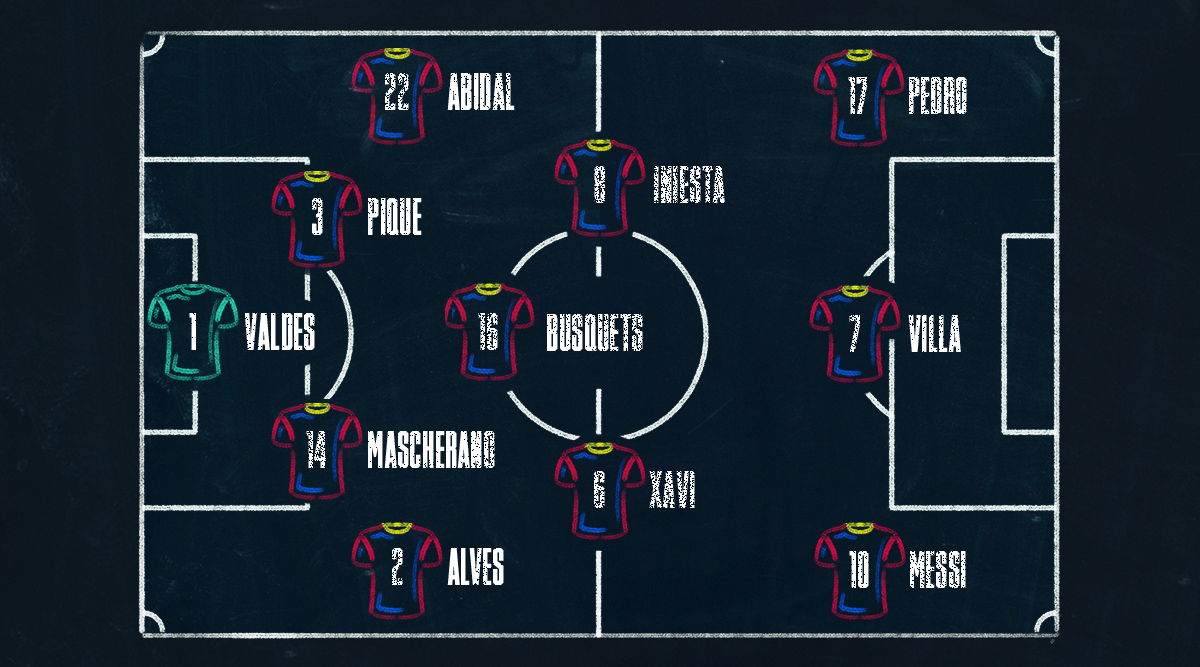
Plenty happened between Pep Guardiola’s two Champions League titles. Eto’o was swapped for Zlatan Ibrahimovic - disastrously - as Zlatan left 12 months later, spitting feathers at Pep, while Eto’o lifted a consecutive treble with Jose Mourinho’s Inter Milan. Mourinho, still angry at not getting Guardiola’s job in 2008, made sure to make a beast of himself when he knocked his adversary out of the Champions League semi-final.
Henry, Marquez, Toure, Hleb, Gudjohnsen and Sylvinho were out - David Villa now led the line, Pedro had burst through the academy, Sergio Busquets was the No.6 and Javier Mascherano was Gerard Pique’s pitbull alongside him. Pep’s first Barcelona team was good - but this really felt like his own side, moulded in his image. By now, Lionel Messi had reached god level, netting 53 times in 55 games of this campaign.
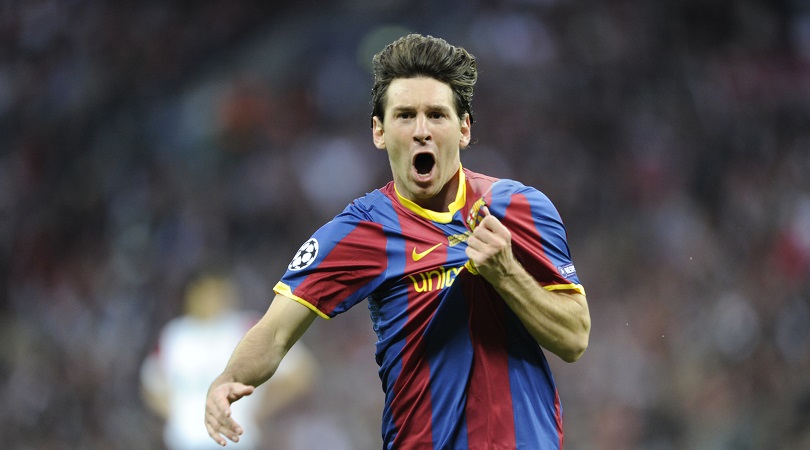
This was the season that perhaps Pep Guardiola still has to match up to. The football was absolutely exquisite. The team was otherworldly. They won 16 La Liga matches in a row, including the Clasico 5-0 and then dismantled Sir Alex Ferguson’s Manchester United in the Champions League final at Wembley.
There has perhaps never been a team this good in world football. A beaten Ferguson admitted that Messi was the finest player he’d ever seen. Football perfection is something that Barca have been searching for, throughout their history. They’ve come so very near so very many times - but this is definitely their best case for it.
More stories
FFT's Matt Ketchell has argued that VAR isn't the issue - it's the lack of trained officials at grassroots level that creates a lack of quality at the top.
A European giant has joined the race for Ivan Toney's signature, but could it be too little, too late? Manchester United have been linked with a move for Atletico Madrid and France star Antoine Griezmann. Meanwhile, a former Barcelona defender could potentially be on his way to Old Trafford.







